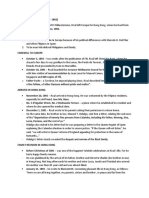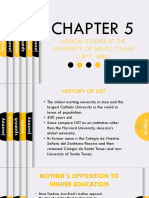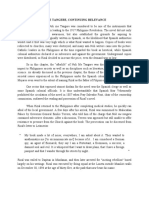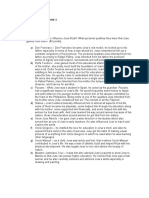Pluma Rizal, Ang Dakilang Manunulat
Pluma Rizal, Ang Dakilang Manunulat
Uploaded by
Mahusay Neil DominicCopyright:
Available Formats
Pluma Rizal, Ang Dakilang Manunulat
Pluma Rizal, Ang Dakilang Manunulat
Uploaded by
Mahusay Neil DominicOriginal Title
Copyright
Available Formats
Share this document
Did you find this document useful?
Is this content inappropriate?
Copyright:
Available Formats
Pluma Rizal, Ang Dakilang Manunulat
Pluma Rizal, Ang Dakilang Manunulat
Uploaded by
Mahusay Neil DominicCopyright:
Available Formats
Image not found or type unknown
Pluma: Rizal, Ang Dakilang Manunulat
Jose Rizal, just like any of us, used to live an ordinary life. Just like a normal person, he underwent
the mundane stages of human life such as infancy, childhood, adolescence, and adulthood. Yet,
unlike any of us, Rizal inadvertently stood out because he lived by the saying, “Live life to the fullest.”
He made the best out of his 35 years of existence. However, certain events and persons might have
inspired him on the first place that eventually transformed his life from ordinary to an “extraordinary”
one. Rizal’s parents, Francisco Mercado and Teodora Alonso, had already introduced to him the
value of education. His father owned several books in their shelf in which the young Rizal had a lot of
novels to choose from and to read that suits his interest as a child. His mother also served as his first
teacher. She taught him how to read and write. At an early age, he already shows brilliance as a
writer with a good sense of social awareness.
An 8-year old Rizal was able to write his first poem, “Sa Aking mga Kabata.” This poem highlights
love of nationality and Filipino language. Additionally, he excelled academically when he started
attending schools in the Philippines, as well as in abroad. Putting his thoughts into writing became his
hobby through the years. His works such as A La Juventud Filipina and El Consejo de los Dioses
earned him the recognition to the Filipino youth and won an award in Manila respectively. Given the
fact that Rizal’s eyes had long been opened to the awful reality during Spanish colonization, he
further wrote novels, which include the famous Noli Me Tangere (Touch Me Not) and El Filibusterismo
(The Reign of Greed).
Most likely, the former includes the story of Sisa, which was said to be inspired by what happened to
his mother, Teodora, who was imprisoned due to the accusation of poisoning her sister-in-law. This
taste of injustice could have aided Rizal to boost his patriotism. The latter was also written in honor of
the memory of GOMBURZA who were executed due to the 1872 Cavite mutiny. With the aid of
Paciano who witnessed the execution, Rizal’s eyes became widely opened to the gruesome reality of
the Philippine society during their time. In a celebration of the achievement of Juan Luna’s Spoliarium
and Felix Resurreccion Hidalgo’s Las Virgenes Cristianas Expuestas al Populacho, Rizal also
realized and proclaimed that Filipinos do have something to be proud of.
Don't know where to start with your assignment?
HIRE VERIFIED EXPERT
Let our experts help you
You might also like
- Jose Rizal's Collaborations with Other HeroesFrom EverandJose Rizal's Collaborations with Other HeroesRating: 4 out of 5 stars4/5 (6)
- The Trials of The Rizal Bill - EDITED2Document31 pagesThe Trials of The Rizal Bill - EDITED2Jasmine Carlos100% (2)
- Jose Rizal'S Life: Exile, Trial and Death: Learning OutcomesDocument17 pagesJose Rizal'S Life: Exile, Trial and Death: Learning OutcomesEr WinNo ratings yet
- Cardinal Rufino SantosDocument11 pagesCardinal Rufino SantosEdwin Samis100% (2)
- The Interesting Tales of the Jose Rizal FamilyFrom EverandThe Interesting Tales of the Jose Rizal FamilyRating: 4 out of 5 stars4/5 (10)
- ZafraDocument2 pagesZafraJadze Princeton Narag100% (1)
- Sa Mga Kababaihan NG MalolosDocument2 pagesSa Mga Kababaihan NG MalolosGie Andal100% (1)
- RizalDocument4 pagesRizalChu Kingsley50% (2)
- Chapter 9 - Life and Works of Rizal - Philippines As A Century Hence (Filipinas Dentro de Cien Años)Document10 pagesChapter 9 - Life and Works of Rizal - Philippines As A Century Hence (Filipinas Dentro de Cien Años)Ma AntonioNo ratings yet
- THE Philippines A Century Hence: Shane Tiffanie Halili Charlene Grace Millano Kristine Denise Tan'Document47 pagesTHE Philippines A Century Hence: Shane Tiffanie Halili Charlene Grace Millano Kristine Denise Tan'maricrisandemNo ratings yet
- CHAPTER-7 RizalDocument13 pagesCHAPTER-7 RizalKim angelaNo ratings yet
- GROUP 8 The Trial and Martyrdom of RizalDocument47 pagesGROUP 8 The Trial and Martyrdom of RizalKimberly Faith J. Velasco100% (1)
- Rizal in DapitanDocument64 pagesRizal in DapitanA-Jay Olvenia100% (1)
- Geclwr PDFDocument2 pagesGeclwr PDFPatricia Mae RiveraNo ratings yet
- 12 Ileto - Rizal and The Underside of Philippine HistoryDocument37 pages12 Ileto - Rizal and The Underside of Philippine Historyclaire yowsNo ratings yet
- I Am Sharing The Life and Works of Rizal With YouDocument57 pagesI Am Sharing The Life and Works of Rizal With YouAngelo RoqueNo ratings yet
- The Life of Rizal: Educational Background Writings Travel ExperiencesDocument9 pagesThe Life of Rizal: Educational Background Writings Travel ExperiencesMary Joy Morallon CalaguiNo ratings yet
- This Study Resource Was: Topic 3 "Philippines A Century After" 1.5Document2 pagesThis Study Resource Was: Topic 3 "Philippines A Century After" 1.5jake100% (1)
- The Life and Works of Jose Rizal: Noli Me TangereDocument17 pagesThe Life and Works of Jose Rizal: Noli Me TangereNathaniel Bongco0% (1)
- Why Counting Counts Reporting ScriptDocument4 pagesWhy Counting Counts Reporting ScriptERWIN MORGIANo ratings yet
- Veneration Without Understanding Who Made Rizal Our Foremost Hero and Why?Document2 pagesVeneration Without Understanding Who Made Rizal Our Foremost Hero and Why?Kim PonceNo ratings yet
- Noli Me TangereDocument2 pagesNoli Me TangereCheery joy Mante EscrinNo ratings yet
- Module 8 Cracks Within The Catholic Church and The Cavite MutinyDocument6 pagesModule 8 Cracks Within The Catholic Church and The Cavite MutinyClaire Evann Villena EboraNo ratings yet
- Rizal PastellsDocument6 pagesRizal PastellsJoseph BallenaNo ratings yet
- LaurelDocument3 pagesLaurelGeojanni PangibitanNo ratings yet
- El Filibusterismo: by Jefferson R. MendezDocument13 pagesEl Filibusterismo: by Jefferson R. MendezavimalditaNo ratings yet
- Objective:: Summary of QualificationDocument3 pagesObjective:: Summary of QualificationDanmar ArtetaNo ratings yet
- Activity On Morga's Sucesos de Las Islas FilipinasDocument2 pagesActivity On Morga's Sucesos de Las Islas FilipinasKrista CandareNo ratings yet
- The Indolence of The Filipino People - Critical AnalysisDocument2 pagesThe Indolence of The Filipino People - Critical AnalysisAngela Ricaplaza ReveralNo ratings yet
- Reflection Paper-Hymn To LaborDocument1 pageReflection Paper-Hymn To LaborSul-aron Cherry rose M.No ratings yet
- Why Counting CountsDocument29 pagesWhy Counting CountsJustin Ramos GollosoNo ratings yet
- Borneo Colonization Project: March 7, 1892Document1 pageBorneo Colonization Project: March 7, 1892Da91197No ratings yet
- Rizal's Life Family Childhood Education and Life AbroadDocument4 pagesRizal's Life Family Childhood Education and Life AbroadDean Mark YuNo ratings yet
- First HomecomingDocument12 pagesFirst HomecomingDiana Rose EsparesNo ratings yet
- Characters (Activate Prior Knowledge)Document9 pagesCharacters (Activate Prior Knowledge)Nathaniel PulidoNo ratings yet
- Life of Jose Rizal in Belgium :) )Document4 pagesLife of Jose Rizal in Belgium :) )Ervin Jello Rosete RagonotNo ratings yet
- Introduction To The Module Objective: I. PreliminariesDocument26 pagesIntroduction To The Module Objective: I. Preliminarieseva marie roblesNo ratings yet
- The Jesuit VersionDocument7 pagesThe Jesuit VersionChris Tine Bedural100% (2)
- Reaction Paper of Rizal in DapitanDocument3 pagesReaction Paper of Rizal in DapitanJeana Marie Barro100% (1)
- Purposive Communication: Characteristics of LanguageDocument6 pagesPurposive Communication: Characteristics of LanguageBelle MendozaNo ratings yet
- Rizal's Speech Honoring Luna and HidalgoDocument12 pagesRizal's Speech Honoring Luna and HidalgoJeric_Q0% (2)
- (MODULE V) TOPIC 2 - On The Indolence of The Filipino People PDFDocument3 pages(MODULE V) TOPIC 2 - On The Indolence of The Filipino People PDFsampdnimNo ratings yet
- Rizal Module 10 JCDocument12 pagesRizal Module 10 JCFer-J TagacayNo ratings yet
- Ferdinand Schneider BlumentrittDocument6 pagesFerdinand Schneider Blumentrittmayu harukoNo ratings yet
- Jose Rizal As Dramatist and NovelistDocument21 pagesJose Rizal As Dramatist and NovelistJeff ValerioNo ratings yet
- RIZAL Sa DAPITANDocument5 pagesRIZAL Sa DAPITANIra270% (1)
- Rizal's Exile, Trial, Etc.Document23 pagesRizal's Exile, Trial, Etc.Mark Darius A. MabborangNo ratings yet
- Chapter 5 Rizal ReportingDocument39 pagesChapter 5 Rizal ReportingShiroa Noko0% (1)
- Noli Me TangereDocument30 pagesNoli Me TangereNikka GoenettNo ratings yet
- IndolenceDocument21 pagesIndolenceMikee Mendiola83% (6)
- Chapter 10 - Noli Me Tangere, Continuing RelevanceDocument2 pagesChapter 10 - Noli Me Tangere, Continuing RelevanceAnne Xx100% (1)
- La Liga FilipinaDocument7 pagesLa Liga FilipinaEmerson Gonzales TañaNo ratings yet
- Aftermath of Rizal's DeathDocument20 pagesAftermath of Rizal's Deathjekhe vem dabloNo ratings yet
- 1 Rizal in FranceDocument15 pages1 Rizal in FranceLi ReNo ratings yet
- Amor Patrio FinalDocument4 pagesAmor Patrio FinalKATHERINE GALDONESNo ratings yet
- The Death of Jose RizalDocument3 pagesThe Death of Jose RizalFray Relly OarNo ratings yet
- Rizal and The KatipunanDocument18 pagesRizal and The KatipunanAngelica PagaduanNo ratings yet
- RizalDocument10 pagesRizalJojames GaddiNo ratings yet
- The Entrapment and His Exile in Dapitan Rizal's ArrestDocument12 pagesThe Entrapment and His Exile in Dapitan Rizal's ArrestSherjohn tombocNo ratings yet
- Bsme Neildominic MahusayDocument5 pagesBsme Neildominic MahusayMahusay Neil DominicNo ratings yet
- Seatwork Rizal101Document2 pagesSeatwork Rizal101Mahusay Neil DominicNo ratings yet
- C9P3 Jurven GulaneDocument1 pageC9P3 Jurven GulaneMahusay Neil DominicNo ratings yet
- A Letter To My Future SelfDocument1 pageA Letter To My Future SelfMahusay Neil DominicNo ratings yet
- LeashitDocument5 pagesLeashitMahusay Neil DominicNo ratings yet
- 38 30 PBDocument8 pages38 30 PBMahusay Neil DominicNo ratings yet
- Activity 2 - Pumps - Me 423 - No AnsDocument2 pagesActivity 2 - Pumps - Me 423 - No AnsMahusay Neil DominicNo ratings yet
- Quiz 1 - Simple Stress Analysis - No AnalysisDocument1 pageQuiz 1 - Simple Stress Analysis - No AnalysisMahusay Neil DominicNo ratings yet
- Me 412B - Quiz 1 - Prelim - No AnsDocument1 pageMe 412B - Quiz 1 - Prelim - No AnsMahusay Neil DominicNo ratings yet
- Summary Report (4799)Document7 pagesSummary Report (4799)Mahusay Neil DominicNo ratings yet
- HR-008 Memo 13 and 14Document6 pagesHR-008 Memo 13 and 14Mahusay Neil DominicNo ratings yet
- Aircon Problems Set2Document9 pagesAircon Problems Set2Jsbebe jskdbsjNo ratings yet
- Rizal101 Assignment 1Document2 pagesRizal101 Assignment 1Mahusay Neil DominicNo ratings yet
- History 101 Assignment 2Document1 pageHistory 101 Assignment 2Mahusay Neil DominicNo ratings yet
- 2 Stroke VS 4 StrokeDocument3 pages2 Stroke VS 4 StrokeMahusay Neil DominicNo ratings yet
- History 101 AssignmentDocument2 pagesHistory 101 AssignmentMahusay Neil DominicNo ratings yet
- Tensile Test On Cast Iron: Mike Lester C. Apas BSME-3Document6 pagesTensile Test On Cast Iron: Mike Lester C. Apas BSME-3Mahusay Neil DominicNo ratings yet
- PUMP SIZING COMPUTATION (ENGR. ENAD) RevisedDocument6 pagesPUMP SIZING COMPUTATION (ENGR. ENAD) RevisedMahusay Neil Dominic100% (1)
- UCLM ENGINEERING TSHIRT (MECHANICAL ENGINEERING) (Responses) - Form Responses 1Document1 pageUCLM ENGINEERING TSHIRT (MECHANICAL ENGINEERING) (Responses) - Form Responses 1Mahusay Neil DominicNo ratings yet
- DelapenareportDocument3 pagesDelapenareportMahusay Neil DominicNo ratings yet
- Day 2-3 CparDocument3 pagesDay 2-3 CparPontejos Princess Dianne G.No ratings yet
- Activity #1 Vinluan, Bianca Gayle B. GE 16 / 11:00-1:00 Prof. Maryknoll Pangan-SorianoDocument20 pagesActivity #1 Vinluan, Bianca Gayle B. GE 16 / 11:00-1:00 Prof. Maryknoll Pangan-SorianoBianca Vinluan100% (1)
- Noli Me Tangere Buod NG Buong KwentoDocument11 pagesNoli Me Tangere Buod NG Buong KwentoMark Joseph Delima100% (1)
- Introduction To Rizal Course: Lecture # 1Document7 pagesIntroduction To Rizal Course: Lecture # 1Karla Katrina CajigalNo ratings yet
- The Chinese Mestizo in Philippine HistoryDocument15 pagesThe Chinese Mestizo in Philippine HistoryAnjela May Hintoloro100% (1)
- CASC EL 1st Sem 22 23Document380 pagesCASC EL 1st Sem 22 23Luis NovenarioNo ratings yet
- Andres Bonifacio and The KatipunanDocument2 pagesAndres Bonifacio and The KatipunanPatrick BacongalloNo ratings yet
- 5 HistoriesDocument13 pages5 HistoriesAleli Isabel DemecilloNo ratings yet
- SRN 585Document2 pagesSRN 585Michael Anjielo TabuyanNo ratings yet
- A. Roads A.1 Local Roads: Proposed Infrastructure Projects CY 2020 (CONTINGENCY FUND)Document120 pagesA. Roads A.1 Local Roads: Proposed Infrastructure Projects CY 2020 (CONTINGENCY FUND)Gioharry Nul PanambulanNo ratings yet
- Amalia FuentesDocument1 pageAmalia FuentesCorona VirusNo ratings yet
- Filipino 10 Catch Up Fridays Learning Resources 1Document1 pageFilipino 10 Catch Up Fridays Learning Resources 1Lorie Bautista60% (5)
- Quiz # 1: Rizal Life: Childhood, Family and Early EducationDocument6 pagesQuiz # 1: Rizal Life: Childhood, Family and Early Educationblueberry100% (1)
- Unit 5 - Lesson 1 Gamaba IDocument19 pagesUnit 5 - Lesson 1 Gamaba ILlords Mielzen GamoteaNo ratings yet
- Rizal ReportDocument12 pagesRizal ReportNurhasimah ArshadNo ratings yet
- ACTIVITY 2 NewDocument1 pageACTIVITY 2 NewBrix AngeloNo ratings yet
- Faq Pops DirectDocument14 pagesFaq Pops Directeda tenajerosNo ratings yet
- Kataastaaasan, Kagalanggalangang Katipunan NG Mga Anak NG BayanDocument35 pagesKataastaaasan, Kagalanggalangang Katipunan NG Mga Anak NG BayanJanelle Chin MesamenNo ratings yet
- NO President VoteDocument1 pageNO President Voteapi-27189035No ratings yet
- Readings in Philippine History: TH THDocument2 pagesReadings in Philippine History: TH THLaleth Mendoza OjalesNo ratings yet
- Philippine-History MOCK TESTDocument3 pagesPhilippine-History MOCK TESTJamie anne AbreaNo ratings yet
- MaineDocument2 pagesMaineGeneva Roujh SantosNo ratings yet
- The Rizal AncestryDocument3 pagesThe Rizal AncestryMylz MendozaNo ratings yet
- Rizal's FamilyDocument32 pagesRizal's FamilyKylene Leh Pedrocillo Ostonal-JeonNo ratings yet
- Chapter 21 - Second Homecoming and The Liga FilipinaDocument3 pagesChapter 21 - Second Homecoming and The Liga FilipinahelloNo ratings yet
- Trinidad SoledadDocument2 pagesTrinidad SoledadArsela MaeNo ratings yet
- Masterlist of Secondary SchoolsDocument1,500 pagesMasterlist of Secondary SchoolsIan Alpa90% (30)
- LTO NCR East List of Accreditted Driving Schools For 2020Document8 pagesLTO NCR East List of Accreditted Driving Schools For 2020Joshua SanchezNo ratings yet
- LE1 Tejeros ConventionDocument4 pagesLE1 Tejeros ConventionMecha VelosoNo ratings yet
- Discount 1299 BarangaysDocument64 pagesDiscount 1299 BarangaysKhiann AbaisNo ratings yet













































































































